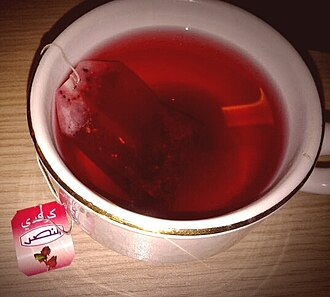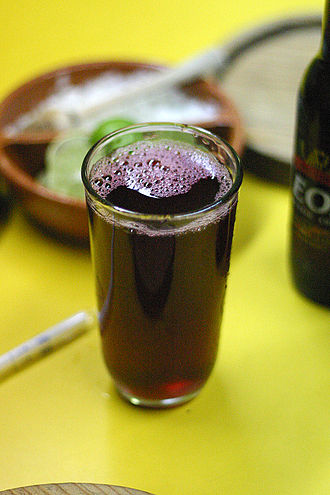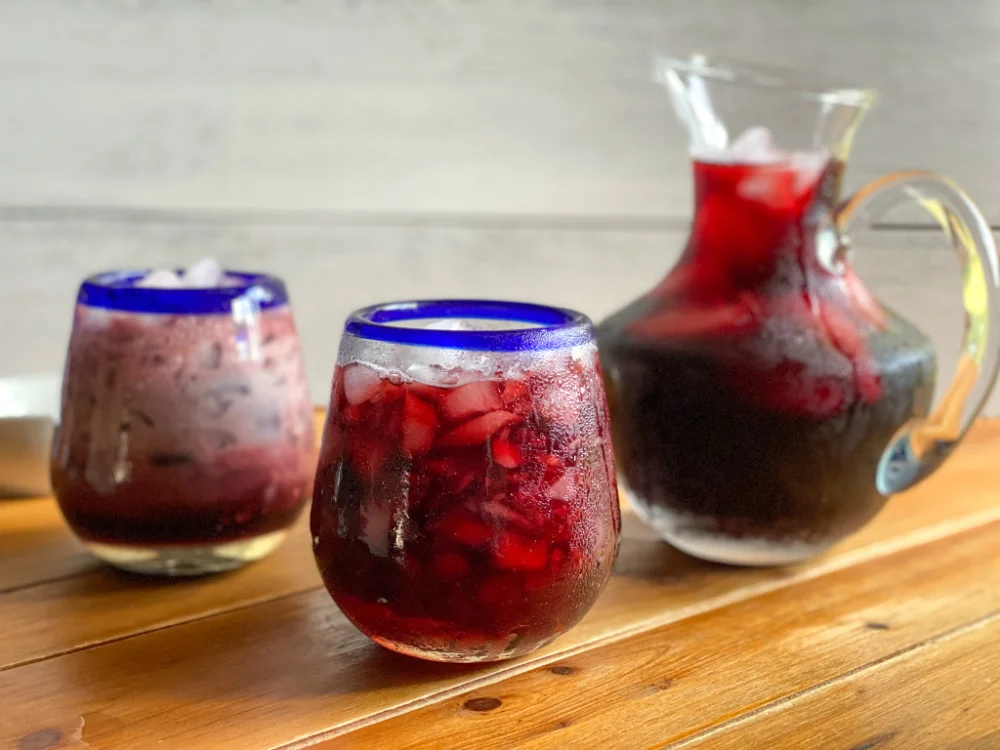Hibiscus tea is a herbal tea made as an infusion from crimson or deep magenta-colored calyces (sepals) of the roselle (Hibiscus sabdariffa) flower. It is consumed both hot and cold and has a tart, cranberry-like flavor.
Consumption: Africa
The roselle hibiscus used to make the tea likely originated in Africa.[1] In Africa, hibiscus tea is commonly sold in markets and the dried flowers can be found throughout West and East Africa. Variations on the drink are popular in West Africa and parts of Central Africa. In Senegal, bissap is known as the "national drink of Senegal". Hibiscus tea is often flavored with mint or ginger in West Africa. In Ghana it is known as "sobolo", and "zobo" in Nigeria.
Karkadé (Arabic: كَركَديه karkadīh pronounced [kɑrkæˈdiːh]) is served hot or chilled with ice. It is consumed in some parts of North Africa, especially in Egypt and Sudan

Consumption: Americas
Agua de flor de Jamaica, also called agua de Jamaica and rosa de Jamaica, is popular in Mexico, Central America, and parts of South America and the Caribbean. It is one of several common aguas frescas, which are inexpensive beverages typically made from fresh juices or extracts. Jamaica and other aguas frescas are commonly found in taquerias or other Mexican restaurants. It is usually prepared by steeping the calyces in boiling water, straining the mixture, pressing the calyces (to squeeze all the juice out), adding sugar, and stirring. It is served chilled, and in Jamaica, this drink is a tradition at Christmas, served with fruitcake or sweet potato pudding

In Panama, both the flowers and the drink are called saril (a derivative of the English word sorrel). It is prepared by picking and boiling the calyces with chopped ginger, sugar, clove, cinnamon, and nutmeg. It is traditionally drunk around Christmas and Chinese New Year. This diverges from Mexico and Central America and is much more in line with the Caribbean, due to the strong West Indian influence in Panamanian culture; especially in Panama City and most of Panama's Caribbean coast.
In the English-speaking Caribbean, the drink, called sorrel, is made from the calyces, and it is considered an integral part of Christmas celebrations. In American soul food cuisine, hibiscus tea is included in a category of "red drinks" associated with West Africa.
Consumption: Southeast Asia
In Thailand, most commonly, roselle is prepared as a cold beverage, heavily sweetened and poured over ice, similar to sweetened fruit juices. Plastic bags filled with ice and sweetened 'grajeab' can be found outside most schools and in local markets. It is less commonly made into a wine.
Reviews have concluded that hibiscus tea consumption appears to modestly lower blood pressure in people with high blood pressure. Hibiscus tea was generally well tolerated, and did not adversely affect liver or kidney function at lower doses, but may be hepatotoxic at high doses.
Hexbear links
- 🐻Link to all Hexbear comms
- 📀 Come listen to music and Watch movies with your fellow Hexbears nerd, in Cy.tube
- 🔥 Read and talk about a current topics in the News Megathread
- ⚔ Come talk in the New Weekly PoC thread
- ✨ Talk with fellow Trans comrades in the New Weekly Trans thread
- 👊 Share your gains and goals with your comrades in the New Weekly Improvement thread
- 🧡 Disabled comm megathread
reminders:
- 💚 You nerds can join specific comms to see posts about all sorts of topics
- 💙 Hexbear’s algorithm prioritizes comments over upbears
- 💜 Sorting by new you nerd
- 🌈 If you ever want to make your own megathread, you can reserve a spot here nerd
- 🐶 Join the unofficial Hexbear-adjacent Mastodon instance toots.matapacos.dog
Links To Resources (Aid and Theory):
Aid:
Theory:

my wife feels kinda torn about language learning right now. so she has been learning German for quite some time, to eventually read a bunch of different German philosophers in German, and she has made a LOT of progress. but then she sees me learning Mandarin and getting immediate use out of it from the months I have been learning it as opposed to her long term goal. she also wants to learn Mandarin, but ofc only has so much capcity to devote to learning a whole ass other langauge on top of a promotion at work. I have told her to stick with the German, I am very proud of her progress and it would not be worth it to throw that away. she is a very intensive single focused learner who will devote 10-20 hours a week to something, but only that one topic so its really not like doing 2 languages is a good idea for how she learns. kind of feel like a bit of a dickhead for being like no, dont do this thing you see me getting gratification from that you have expressed a desire to also partake in, and one we could do together (no way in hell I am learning kraut, we settled that in 45)
Although the tone stuff can be hard for most western language speakers, the grammar is way simpler and it's probably faster if you're learning to speak and listen over read and write Chinese as well.
German is consistently underestimated in difficulty for English speakers. The US state department (may they be destroyed) has a difficulty ranking system for their would be diplomats and attaches. Things like French, Norwegian, Swedish get difficulty level 1 (easiest) - Mandarin or Arabic are rated at level 4 (very hard). People think German should be level 1 but it's in level 2, it takes more time. Especially if your wife is focused on classroom training and learning reading/writing without much irl person to person speaking - it's probably the hardest way to learn a language.
For her, her goals, she should probably stick to German and will get something out of it. You know her learning style better than I do, so I'd defer to your judgement on how she learns. German philosophical texts are quite a high target to aim for whereas you may be aiming for something simpler with Mandarin. If she wanted a boost, she should try to get some speaking time with a native speaker or even watch movies/TV in German. Otherwise, she probably should stick with it and treat it like a marathon and not a sprint - learning to read German for the purpose of complex philosophical reading in the native language is a really hard target, it's certainly worthy she should just be prepared to take many many many months of learning and learning. Keep celebrating those little wins and focus on the progress!
her german reading is very good. she can read many academic texts and translate on the fly for me, only stumbling now and then on specific terminologies. but her plans is seriously to read shit like Hegel in 300 year old high fucking German, which very few native German speakers can do without a lot of aditional study. I think she can do it, but even for somebody as ambitious and driven as her, thats a years long project right there.
her speaking is pretty bad, and I keep advising her like watch shitty German kids shows, or meme videos, or join a German LGBT discord or something, but she is much more focused on reading. watching baby shows in Japanese was how I actually got a solid grasp of speaking and listening (shout out to Sazae-san, what a real one that kid is). doesnt help that Germany is currently in a hitlerite speedrun and extremely pro zionist even on the left, so she kinda doesnt want to hang out with Germans
If you've never seen Lola Rennt that's kind of fun. Er ist wieder da is darkly funny (it's about actual Hitler coming back, he is treated as the danger he is but also the buffoon he was). Good bye Lenin is also quite good
I mean its not like I told her no or Id be upset or w/e, I always give her praise and have pride in her accomplishments and tell her that. I just also want to throw my opinion in when asked that its good to stick with the progress you have made in climbing one mountain, than jumping ship to another one because it looks kinda fun
I think you’re doing the right thing, my partner is doing the same for me and has been telling me to focus on just Mandarin for now instead of flip flopping between it and Japanese like I have been for the past year (despite currently living together in japan). I find switching my brain to anything but English results in them all swirling around together so I currently have a weird mix of Korean, Spanish, Japanese, and Mandarin to cycle through when I try to think of something in another language. Definitely not the most efficient way of doing things so I need to focus on one at a time, sounds like your partner learns the same way. Obviously it’s more fun to learn and practice with your partner but think of it this way: once she masters German your Mandarin will be good enough that you can help teach her and practice conversation together while knowing enough to correct common mistakes!
omfg that weird swirl of several languages in your thought is so real. I was doing French, Spanish, and Japanese at the same time years ago, and my internal monolouge was some insane pidgin of those + English that no other human could ever hope to understand
It would be helpful too if you both ever go stuck somewhere with a Chinese AND a German person.